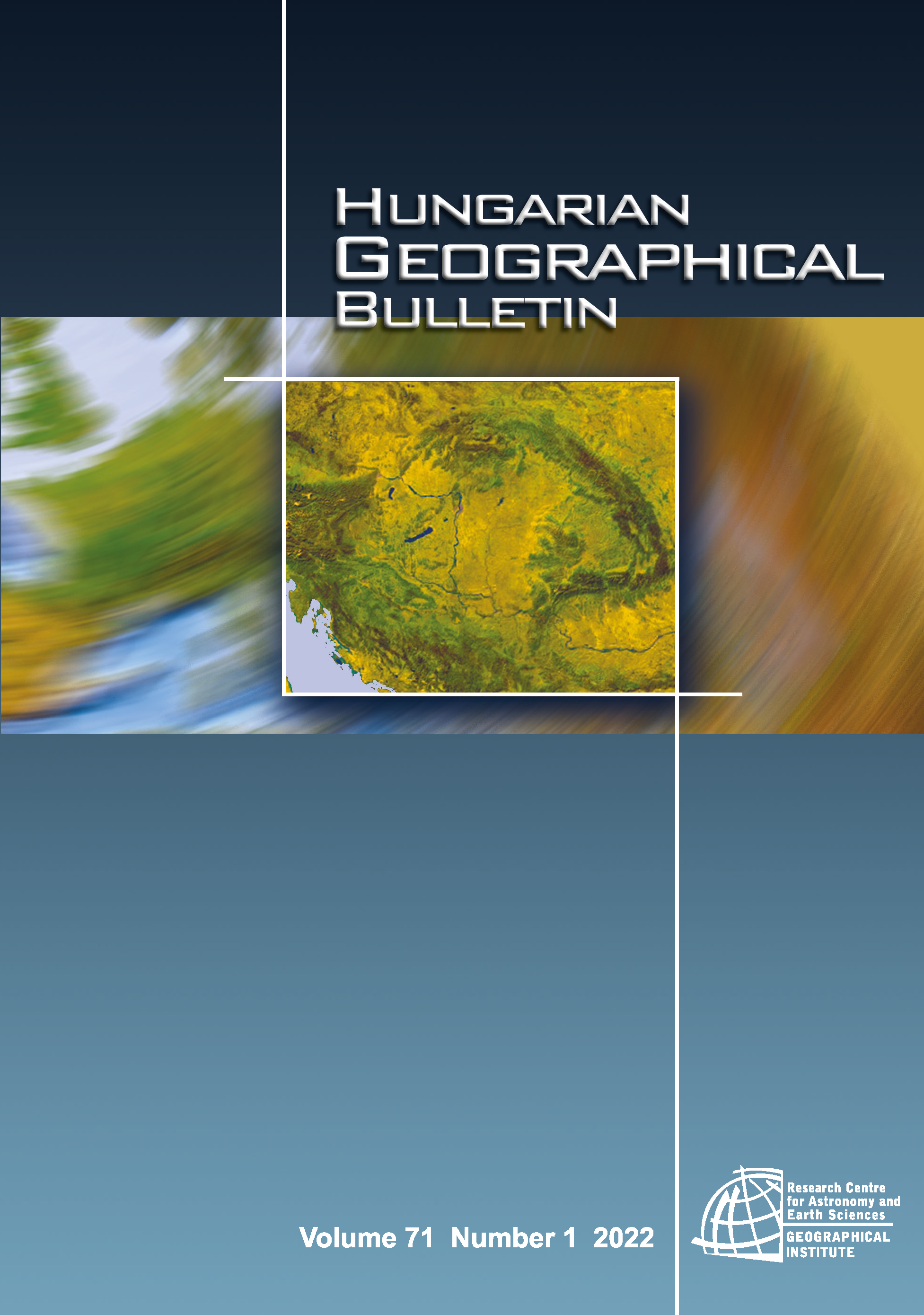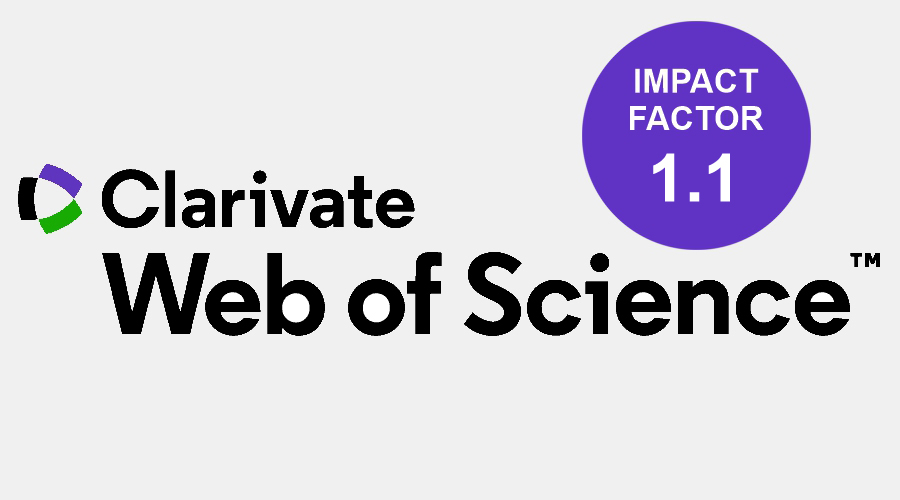Appearance of climatic cycles and oscillations in Carpathian Basin precipitation data
Abstract
A number of climatic cycles and teleconnections are known on the Earth. By definition, the cycles can have a periodic effect on the global climate, while teleconnections can influence the weather at large distances. At the same time, it is overwhelmingly assumed that the hydrological cycle is permanently intensifying all over the world. In this study, we determine and quantify some connections among these climatic cycles and precipitation data from across Hungary. By using cross-correlation and cross-spectral analysis, the connections of the climatic patterns and oscillations with the precipitation of different Hungarian areas have been defined. We used the 1950–2010 timeframe in order to be able to detect effects of several climatic patterns, such as the El Niño-Southern Oscillation (ENSO), the Arctic Oscillation (AO), the North Atlantic Oscillation (NAO), the Pacific/North American teleconnection pattern (PNA) and the Atlantic Multidecadal Oscillation (AMO) on the rainfall events of the Carpathian Basin. Data from four different precipitation measurement sites and oscillation indexes from several databases were used. The results help to understand the patterns and regularities of the precipitation, which is the major source of natural groundwater recharge, and a handy tool for future groundwater management measures. Because of the defined connections, any changes in these teleconnections will probably influence the future utilization of the Hungarian groundwater resources.
References
Abbot, C.G. 1939. Solar variation and the weather. Nature 143. 705-709. https://doi.org/10.1038/143705a0
Allan, A.M. and Hostetler, S.W. 2014. Analysis of the present and future winter Pacific-North American teleconnection in the ECHAM5 global and RegCM3 regional climate models. Climate Dynamics 42. 1671-1682. https://doi.org/10.1007/s00382-013-1910-x
Böschl, G. et al. 2019. Twenty-three unsolved problems in hydrology (UPH) - A community perspective. Hydrological Sciences Journal / Journal des Sciences Hydrologiqes 64. 1141-1158.
Buday, T., Szűcs, P., Kozák, M., Püspöki, Z., McIntosh, R.W., Bódi, E., Bálint, B. and Bulátkó, K. 2015. Sustainability aspects of thermal water production in the region of Hajdúszoboszló-Debrecen, Hungary. Environmental Earth Sciences 74. 7511-7521. https://doi.org/10.1007/s12665-014-3983-1
Burroughs, W.J. 1992. Weather Cycles: Real or Imaginary? Cambridge, Cambridge University Press.
C. E. P. B. 1925. Periodicity in weather and solar phenomena. Nature 115. 853-854. https://doi.org/10.1038/115853b0
Chen, S., Wu, R., Chen, W. and Yu, B. 2020. Recent weakening of the of the linkage between the spring Arctic Oscillation and the following winter El Niño-Southern Oscillation. Climate Dynamics 54. 53-67. https://doi.org/10.1007/s00382-019-04988-7
Darabos, E. 2018. Water Budget Calculation and Data Series Analysis According to Data of Bükk Karst Water Monitoring System. PhD Thesis. Miskolc, University of Miskolc.
Del Genio, A., Lacis, A. and Ruedy, R. 1991. Simulations of the effect of a warmer climate on atmospheric humidity. Nature 351. 382-385. https://doi.org/10.1038/351382a0
Dijkstra, H.A., Raa, L.T., Schmiets, M. and Gerrits, J. 2006. On the physics of the Atlantic Multidecadal Oscillation. Ocean Dynamics 56. 36-50. https://doi.org/10.1007/s10236-005-0043-0
Domonkos, P. 2003. Recent precipitation trends in Hungary in the context of larger scale climatic changes. Natural Hazards 29. 255-271. https://doi.org/10.1023/A:1023690014955
Dvoryaninov, G.S., Kubryakov, A.A., Sizov, A.A., Stanichny, S.V. and Shapiro, N.B. 2016. The North Atlantic Oscillation: A dominant factor in variations of oceanic circulation systems of the Atlantic Ocean. Doklady Earth Sciences 466. (1): 100-104. https://doi.org/10.1134/S1028334X16010207
Enfield, D., Mestas-Nunez, A. and Trimble, P. 2001. The Atlantic multi-decadal oscillation and its relation to rainfall and river flows in the continental US. Geophysical Research Letters 28. (10): 2077-2080. https://doi.org/10.1029/2000GL012745
Fehér, Z.Z. and Rakonczai , J. 2019. Analysing the sensitivity of Hungarian landscapes based on climate change induced shallow groundwater fluctuation. Hungarian Geographical Bulletin 68. (4): 355-372. https://doi.org/10.15201/hungeobull.68.4.3
Feynman, R. 1964. Messenger Lectures at Cornell: The Character of Physical Law Part 7: Seeking New Laws. Ithaca, N.Y., Cornell University. Available at https://www.youtube.com/watch?v=-2NnquxdWFk
Folland, C., Colman, A., Rowell, D. and Davey, M. 2001. Predictability of northeast Brazil rainfall and real-time forecast skill 1987-1998. Journal of Climate 14. (9): 1937-1958. https://doi.org/10.1175/1520-0442(2001)014<1937:PONBRA>2.0.CO;2
GH 2020. Met-analytics/CrossCorrel/. Available at https://github.com/europe-gis/met-analytics/tree/master/CrossCorrel
HMS 2019. Climate Data Series 1901-2019. Budapest, Hungarian Meteorological Service. Available at https://www.met.hu/en/eghajlat/magyarorszag_eghajlata/eghajlati_adatsorok/
Huntington, T. 2006. Evidence for intensification of of the global water cycle: Review and synthesis. Journal of Hydrology 319. (1-4): 83-95. https://doi.org/10.1016/j.jhydrol.2005.07.003
Hurrel, J. 1995. Decadal trends in the North Atlantic oscillation: regional temperatures and precipitation. Science 269. (5224): 676-679. https://doi.org/10.1126/science.269.5224.676
Ilyés, C., Turai, E. and Szűcs, P. 2016. 110 éves hidrológiai adatsorok ciklikus paramétereinek vizsgálata (Investigation of cyclic parameters of 110-year hydrological data sets). Hidrológiai Közlöny 96. (1): 61-70.
Ilyés, C., Turai, E., Szűcs, P. and Zsuga, J. 2017. Examination of the cyclic properties of 110- year long precipitation time series. Acta Montanistica Slovaca 22. (1): 1-11. https://doi.org/10.1556/24.61.2018.01
Ilyés, C., Turai, E. and Szűcs, P. 2018. Examination of rainfall data for 110 years using spectral and wavelet analysis. Central European Geology 61. (1): 1-15. https://doi.org/10.1556/24.61.2018.01
Ionita, M., Rimbu, N., Chelcea, S. and Patrut, S.2012. Multidecadal variability of summer temperature over Romania and its relation with Atlantic Mutidecadal Oscillation. Theoretical and Applied Climatology 113. 305-315. https://doi.org/10.1007/s00704-012-0786-8
IPCC 2012. Managing risks of extreme events and disasters to advance climate change adaptation. In A Special Report of Working Group I and II of the Intergovernmental Panel on Climate Change. Eds.: Field, C. et al., Cambridge, UK. Cambridge University Press. 555-564.
Jakab, G., Bíró, Z., Kovács, Z., Papp, Á., Sarawut, N., Szalai, Z., Madarász, B. and Szabó, Sz. 2019. Spatial analysis of changes and anomalies of intense rainfalls in Hungary. Hungarian Geographical Bulletin 68. (3): 241-253. https://doi.org/10.15201/hungeobull.68.3.3
Knight, J.R., Allan, R.J., Folland, C.K., Vellinga, M. and Mann, M.E. 2005. A signature of persistent natural thermohaline circulation cycles in observed climate. Geophysical Research Letters 32. (20): L20708. https://doi.org/10.1029/2005GL024233
Knight, J., Folland, C. and Scaife, A. 2006. Climate impacts of the Atlantic Multidecadal Oscillation. Geophysical Researh Letters 33. (17): L1770. https://doi.org/10.1029/2006GL026242
Kohán, B. and Szalai, J. 2014. Spatial analysis of groundwater level monitoring network in the Danube-Tisza Interfluve using semivariograms. Hungarian Geographical Bulletin 63. (4): 379-400. https://doi.org/10.15201/hungeobull.63.4.2
Koutsoyiannis, D. 2020. Revisiting global hydrological cycle: Is it intensifying? Hydrology and Earth System Sciences 24. 3899-3932. https://doi.org/10.5194/hess-24-3899-2020
Kuss, A.J.M. and Gurdak, J.J. 2014. Groundwater level response in U.S. principal aquifers to ENSO, NAO, PDO, and AMO. Journal of Hydrology 519. 1939-1952. https://doi.org/10.1016/j.jhydrol.2014.09.069
Liesch, T. and Wunsch, A. 2019. Aquifer responses to long-term climatic periodicities. Journal of Hydrology 572. 226-242. https://doi.org/10.1016/j.jhydrol.2019.02.060
Lüdecke, H.-J., Müller-Plath, G., Wallace, M.G. and Lüning, S. 2021. Decadal and multidecadal natural variability of African rainfall. Journal of Hydrology: Regional Studies 34. 100795. https://doi.org/10.1016/j.ejrh.2021.100795
Marvin, C.F. 1921. Theory and Use of Periodocrite. Washington D.C., US Government Printing Office. https://doi.org/10.1175/1520-0493(1921)49<115:TAUOTP>2.0.CO;2
Matyasovszky, I. 2003. The relationship between NAO and temperature in Hungary and its nonlinear connection with ENSO. Theoretical and Applied Climatology 74. 69-75. https://doi.org/10.1007/s00704-002-0697-1
Meldrum, C. 1873. On a periodicity of rainfall in connection with the sun-spot periodicity. Proceedings of the Royal Society of London 21. 297-308. https://doi.org/10.1098/rspl.1872.0064
Mokhov, I. and Smirnov, D. 2006. Study of the mutual influence of the El Niño-Southern Oscillation Processes and the North Atlantic and Arctic Oscillations. Izvestiya, Atmospheric and Oceanic Physics 42. (5): 598-614. https://doi.org/10.1134/S0001433806050069
Mokhov, I. and Smirnov, D. 2016. Relation between the variations in the global surface temperature, El Niño/La Nina phenomena, and the Atlantic Multidecadal Oscillation. Doklady Earth Sciences 467. (2): 384-388. https://doi.org/10.1134/S1028334X16040115
MT18 2019. Interpret all statistics and graphs for cross correlation. Minitab 18 Support. Available at https://support.minitab.com/en-us/minitab/18/help-and-how-to/modeling-statistics/time-series/how-to/cross-correlation/interpret-the-results/all-statistics-and-graphs/
Nalley, D., Adamowski, J., Biswas, A., Gharabaghi, B. and Hu, W. 2019. A multiscale and multivariate analysis of precipitation and streamflow variability in relation to ENSO, NAO and PDO. Journal of Hydrology 574. 288-307. https://doi.org/10.1016/j.jhydrol.2019.04.024
NCEI 2020. Teleconnections. Silver Spring, Maryland, USA, National Centers for Environmental Information. Available at https://www.ncdc.noaa.gov/teleconnections/
Padilla, A. and Pulido-Bosch, A. 1995. Study of hydrographs of kastic aquifers by means of correlation and cross-spectral analysis. Journal of Hydrology 168. 73-89. https://doi.org/10.1016/0022-1694(94)02648-U
Pekarova, P. and Pekar, J. 2007. Teleconnections of inter-annual streamflow fluctuation in Slovakia with Arctic Oscillation, North Atlantic Oscillation, Southern Oscillation, and Quasi-Biennial Oscillation phenomena. Advances in Atmospheric Sciences 24. (4): 655-663. https://doi.org/10.1007/s00376-007-0655-z
Pongrácz, R. 2003. Joint Effects of Large Scale Circulation and Atmospheric Oscillations (ENSO, NAO) on Regional Climate Parameters. PhD Thesis. Budapest, ELTE Eötvös Loránd University.
Power, S.B. and Kociuba, G. 2011. The impact of global warming on the Southern Oscillation Index. Climate Dynamics 37. (9-10): 1745-1754. https://doi.org/10.1007/s00382-010-0951-7
Priston, W.R. 1939. Solar variation and the weather. Nature 144. 550-551. https://doi.org/10.1038/144550a0
PSL 2020. Climate Timeseries. Boulder, CO, USA, NOAA Physical Sciences Laboratory, GCOS WGSP. Available at https://psl.noaa.gov/data/timeseries/AMO/
Rogers, J. and McHugh, M. 2002. On the seperability of the North Atlantic Oscillation and Arctic Oscillation. Climate Dynamics 19. 599-608. https://doi.org/10.1007/s00382-002-0247-7
Seager, R., Kushnir, J., Nakamura, J., Ting, M. and Naik, N. 2010. Northern Hemisphere winter snow anomalies: ENSO, NAO and the winter of 2009/10. Geophysical Research Letters 37. (14): L14703. https://doi.org/10.1029/2010GL043830
Sfica, L., Beck, C., Nita, A-I., Voiculescu, M., Birsan, M-V. and Philipp, A. 2021. Cloud cover changes driven by atmospheric circulation in Europe during the last decades. International Journal of Meteorology 41. (1): 221-2230. https://doi.org/10.1002/joc.6841
Slonosky, V. and Yiou, P. 2001. The North Atlantic Oscillation and its relationship with near surface temperature. Geophysical Research Letters 28. (5): 807-810. https://doi.org/10.1029/2000GL012063
Song, J., Li, C., Zhou, W. and Pan, J. 2009. The linkage between the Pacific-North American teleconnection pattern and the North Atlantic Oscillation. Advances in Atmospheric Sciences 26. (2): 229-239. https://doi.org/10.1007/s00376-009-0229-3
Soulard, N. and Lin, H. 2017. The spring relationship between the Pacific-North American pattern and the North Atlantic Oscillation. Climate Dynamics 48. 619-629. https://doi.org/10.1007/s00382-016-3098-3
Sun, X., Renard, B., Thyer, M., Westra, S. and Lang, M. 2015. A global analysis of the asymmetric effect of ENSO on extreme precipitation. Journal of Hydrology 530. 51-65. https://doi.org/10.1016/j.jhydrol.2015.09.016
Szöllősi-Nagy, A. 2018. A klímaváltozás a vízről szól? (Is the climate change all about the water?). Innotéka 2018 May. Available at https://www.innoteka.hu/cikk/a_klimavaltozas_a_vizrol_szol.1732.html
Szűcs, P., Virág, M. and Zákányi, B. 2013. Investigation and water management aspects of a Hungarian-Ukrainian transboundary aquier. Water Resources 40. (4): 462-468. https://doi.org/10.1134/S0097807813040131
Szűcs, P., Kompár, L., Palcsu, L. and Deák, J. 2015. Estimation of groundwater replenishment change at a Hungarian recharge area. Carpathian Journal of Earth and Environmental Sciences 10. (4): 227-246.
Thompson, D.W.J. and Wallace, J.M. 1998. The Arctic Oscillation signature in the wintertime geopotential height and temperature fields. Geophysical Research Letters 25. (9): 1297-1300. https://doi.org/10.1029/98GL00950
Velasco, E.M., Gurdak, J.J., Dickinson, J.E., Ferré, T.P.A. and Corona, C.R. 2017. Interannual to multidecadal climate forcings on groundwater resources of the U.S. West Coast. Journal of Hydrology: Regional Studies 11. 250-265. https://doi.org/10.1016/j.ejrh.2015.11.018
W. W. B. 1920. Periodicity in weather and crops. Nature 105. 370-371. https://doi.org/10.1038/105370b0
Zhang, J.-C. 1981. The periodicity and predicability of climate. Journal of the Meteorological Society of Japan 60. 274-280 https://doi.org/10.2151/jmsj1965.60.1_274
Copyright (c) 2022 Csaba Ilyés, Péter Szűcs, Endre Turai

This work is licensed under a Creative Commons Attribution-NonCommercial-NoDerivatives 4.0 International License.






